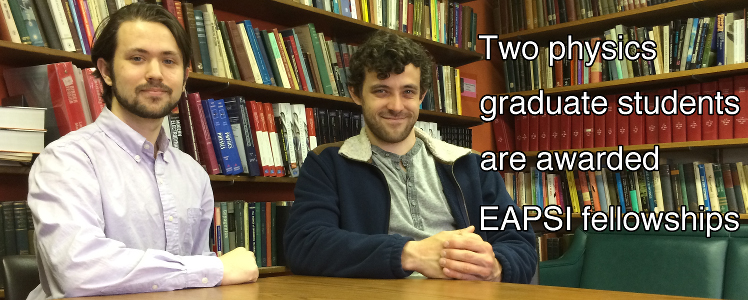Matthew Daniels and Zach McDargh both win EAPSI awards

Matthew Daniels and Zach McDargh, two graduate students in the Department of Physics at Carnegie Mellon University, have won awards within the East Asia and Pacific Summer Institutes (EAPSI) program. These awards, sponsored jointly by the NSF and selected foreign counterpart science and technology agencies, enable U.S. graduate students to do summer research at international institutes in seven East Asia and Pacific locations. Applicants propose a location, host scientist, and research project that is appropriate for the host site and duration of the international visit. Both Matthew and Zach have selected institutes in China, which they will be visiting from June to August this year.
Matthew Daniels is presently working with Prof. Di Xiao on the theory of spin waves in antiferromagnets. He will study with Prof. Jiang Xiao at Fudan University, Shanghai, where they will explore the interactions between spin waves, spin texture, and non-Abelian Berry phases in antiferromagnetic insulators. “It’s a very exciting opportunity,” Matthew describes, “because Prof. Jiang Xiao is an expert in theoretical magnetism, and Prof. Di Xiao is an expert in Berry phase physics. The unexplored overlap between these two fields is very interesting, and our collaboration will be uniquely equipped to pursue it.”
Zach McDargh, who is working with Prof. Markus Deserno on several topics in theoretical biophysics, will be visiting the group of Prof. Zhanchun Tu in the Department of Physics at Beijing Normal University. “Prof. Tu’s research almost ideally combines two of my current scientific interests,” explains Zach. “He has long been very active in the field of biomembrane and biopolymer elasticity, where he has developed elegant differential geometric tools. But he also has an interest in non-equilibrium thermodynamics, which I am very eager to learn more about.”
EAPSI awards provide excellent professional training opportunities for graduate students, but they go beyond mere education. “Traveling to foreign places and striking up close scientific collaborations with well-known experts in one’s field of study is an excellent networking opportunity,” explains Deserno, “and it may well open up other exciting avenues for later, such as a PostDoc position.” And Di Xiao adds, “One should also not forget that, at the end of the day, the connections our students forge really bring our research groups and departments closer together. Matthew and Zach will be ambassadors for CMU physics, and I’m sure they’ll be doing a great job in that role, too.”
###
Story by Markus Deserno